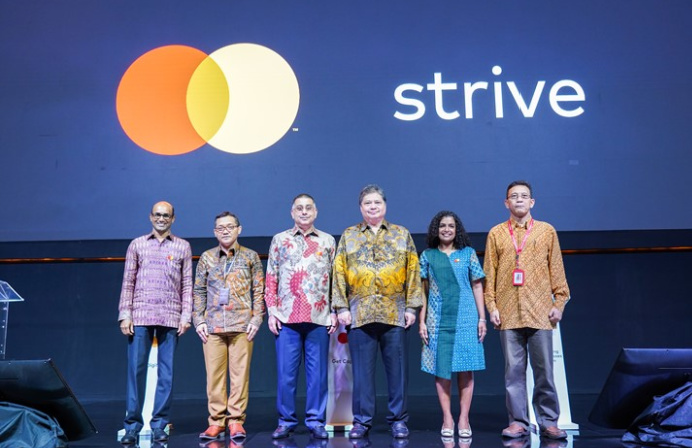
A joint initiative between Mastercard, the Indonesian National Council for Financial Inclusion (DNKI) and Mercy Corps Indonesia has launched to support Indonesian small businesses navigate the digital economy.
The three-year initiative, Mastercard Strive Indonesia, is part of a suite of philanthropic programs supported by the Mastercard Center for Inclusive Growth seeking to help small businesses scale-up their operations to flourish in the digital economy.
This is the first Strive initiative to launch in the Asia-Pacific region, with others already established in the U.S., the UK, Mexico and Czechia collectively supporting 10 million small businesses.
“Digitalisation can help small businesses save costs, make more money, weather volatility and increase productivity. However, in order to take advantage of the benefits of digitalization, they need the right support,” Payal Dalal, Senior Vice President, Social Impact, International Markets at the Mastercard Center for Inclusive Growth, said.
“Strive Indonesia is designed to build demand for digitalisation and lower barriers to adoption to enable small businesses to tap into the power of digital technology to build resilience and grow.”
Small, micro and medium-sized enterprises (MSMEs) have contributed to 61 per cent of Indonesia’s gross domestic product (GDP) and account for 64 million or 99 per cent of the total number of the nation’s enterprises. Research from the Indonesian Government, however, has flagged only 17.5 million MSMEs have entered the digital economy, with a further 18 million lacking access to formal financing and 46 million requiring additional financing for business capital and investment.
“One of programmatic focus areas for Mercy Corps Indonesia is increasing economic opportunities and access to financial services,” Ade Soekadis, Executive Director, Mercy Corps Indonesia, said.
“Through entrepreneurship digital training and mentoring, improving access to financial and market services, and supporting the ecosystem, Mercy Corps Indonesia supports the emergence of effective market systems to address the needs of Micro and Small Enterprises (including women and youth). Mercy Corps Indonesia is honoured to implement the Strive Indonesia program in collaboration with the Mastercard Center for Inclusive Growth and National Financial Inclusion Council (DNKI).”
Mastercard Strive Indonesia will focus on three priority areas including:
- “Go digital and grow networks and know-how – Build demand and lower barriers to technology adoption through peer mentoring and addressing the cost of digitalisation.
- Get capital – Work closely with bank and non-bank institutions to further democratize access to credit for small businesses, especially for women-led or owned businesses.
- Strengthening the small business support ecosystem – Establish a learning network and conduct research on small business digitization to share best practices and insights, co-create initiatives to address systemic bottlenecks, provide the ecosystem with rich quantitative data, and trigger positive shifts.”
“Small businesses are the backbone of the Indonesian economy, and the Indonesian government has been striving to expand the coverage of digitalization of MSMEs, one of the strongest pillars of the Indonesian economy,” Navin Jain, President Director, PT Mastercard Indonesia, said.
“Mastercard is delighted to partner with Mercy Corps Indonesia and DNKI to launch Strive Indonesia to assist Indonesian small businesses in improving their financial resilience and business growth through increased digitization and access to credit. The initiative will also enhance small businesses’ cyber resilience by improving their cybersecurity awareness and skills. This partnership strengthens Mastercard’s commitment to supporting the government’s effort to help 30 million MSMEs transition into the digital ecosystem by 2024.
“When small businesses thrive, our local communities and economies thrive. By working together, Mastercard believes it can help strengthen small businesses and unleash their full potential to advance inclusive economic growth.”
